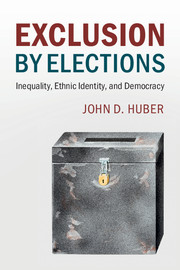PART II - EMPIRICAL EVIDENCE FOR THE ARGUMENT
Published online by Cambridge University Press: 18 May 2017
Summary
Part II includes four chapters focusing on the empirical implications of the theoretical argument developed in Part I. Chapter 6 discusses the issue of identifying causal effects. My empirical evidence does not allow me to estimate causal effects of anything at all, which leaves open a host of questions about what we should believe following the presentation of such evidence. I point out that a focus on identification issues can create unhelpful biases in how we do social science research. More importantly, I argue for a particular way to integrate theory with empirical research, one that can help us update our beliefs about causality even when we do not have direct empirical evidence of causal effects.
Chapters 7 to 9 present the empirical evidence. The theoretical argument suggests that the relationship between income and the vote should be strongest when the conditions for class politics related to inequality and ethnic polarization are strongest. Chapter 7 explores this theoretical implications by estimating individual-level models of vote choice across a range of countries. The argument also suggests that we should see stronger ethnic bases of support when the conditions for class politics are weak. This is the focus of Chapter 8.
After exploring patterns related to voting behavior in Chapters 7 and 8, Chapter 9 turns to macropolitical outcomes. The main focus of the chapter is on whether patterns of redistribution are consistent with the theory, where redistribution is highest when the conditions for class politics are strongest. In addition, I explore indirect implications of the model for understanding transitions to democracy.
Information
- Type
- Chapter
- Information
- Exclusion by ElectionsInequality, Ethnic Identity, and Democracy, pp. 99 - 100Publisher: Cambridge University PressPrint publication year: 2017
